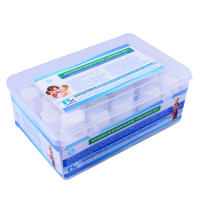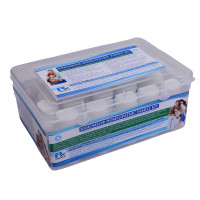Renal Stones
Renal stones or Renal calculi consists of aggregates of crystals and small amounts of protein and glycoprotein but their genesis is poorly understood. The stones in which the crystalline component consists of calcium oxalate and calcium phosphate. Cystine stones and uric acid stones are also found.
The main factors associated with stone formation are as follows.
1.Obstruction of urinary tract, causes formation of calcium phosphate stones.
2.Infection of the urinary tract, causes formation of magnesium ammonium phosphate stones.
3.Climate or occupation giving rise to excessive sweating causing formation of stones due to high concentration of salts.
4.Inherited disorders like cystinuria which causes formation of cystine stones.
5.Gout
The pH of the urine influences the formation of stones.
Clinical features vary according to the size, shape and position of the stone, and the nature of any underlying condition.
Some patients do not have any symptom, until discovered accidentally during radiological examination for another disorder. More commonly patients present with pain, recurrent urinary infection or clinical features of urinary tract obstruction Intermittent dull pain is felt in the loin or back, increased by movement. From time to time protein, red cells or white cells appear in the urine.
When a stone become impacted on the ureter an attack of renal colic develops. The patient is suddenly aware of pain in the loin, which soon radiates round the flank to the groin and often into the testis or labium. The pain steadily increases in intensity to reach a maximum in a few minutes. The patient is restless, and generally tries unsuccessfully to obtain relief by changing position and by pacing the room. There is pallor, sweating and often vomiting, and the patient may groan in agony. Frequency, painful urination and blood in the urine may occur. The intense pain usually subsides within 2 hrs but may continue unabated for hours or days until the stone is passed out.
Homeopathic Treatment:
Chief Remedies:
Berberis Vulgaris : Berberis Vulgaris is also useful in renal colic due to stone in the kidney. Pain in left renal angle starting from left kedney to ureter, then to urinary bladder and coming down to urethra. Pain is associated with numbness, burning and soreness in the kidney region. In acute condition the urine is bloody, greenish with thick slimy mucus and jelly like sediment. In chronic condition urine is dark, turbid with copious sedimentation. Pain is worse on movement or motion.
Pareira Brava : Pareira Brava is a chief remedy for urinary problems with frequent urination. Urine is black, bloody and thick with mucus. There is constant urge for urination with great straining. It is also useful in renal colic with pain down the thighs when trying to pass urine.
Sarsaparilla: Sarsaparilla has a marked action on various urinary troubles like cystitis, renal colic, renal calculi etc. There is severe, almost unbearable pain at te conclusion of urination just as urine ceases to flow. Quite frequently there is passage of gravel or small calculi and white sand in urine. Sarsarapilla is a remedy for the right sided renal colic with excruciating pain from right kidney to downwards. Urine may be scanty or copious, bloody or bright and clear, but irritating. There is painful distention and tenderness in the bladder. Urine dribbles while sitting, passes freely while standing.
| Product Name | SKU | EAN-13 |
|---|---|---|
| Rxhomeo Berberis Vulgaris 30C - 250 Pellets | 1008052 | 8907460080523 |
| Rxhomeo Sarsaparilla 30C - 250 Pellets | 1039352 | 8907460393524 |





